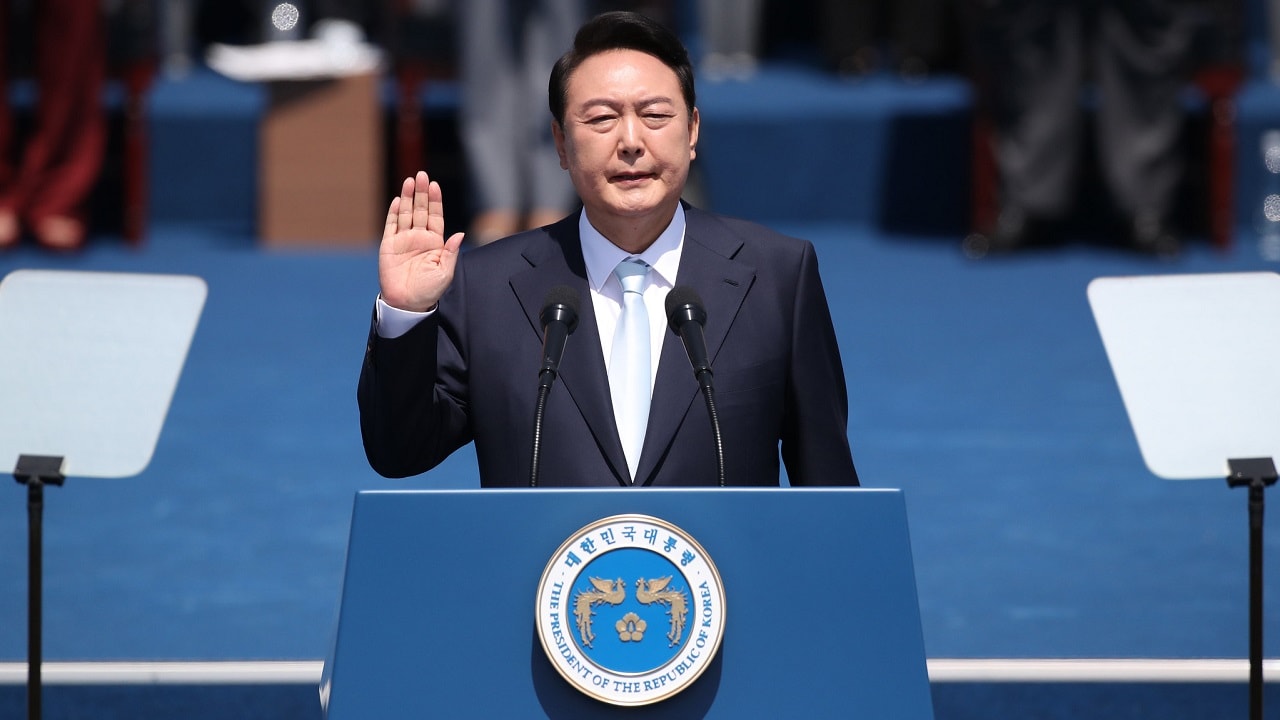Last Friday, U.S. President Joe Biden convened a summit at Camp David with his Japanese and South Korean counterparts. They appear to have gotten on well, and the summit has been hailed as a success.
And indeed, it is a success. Japan and South Korea were barely engaging each other just a few years ago. Deep disagreements over the interpretation of Japanese colonial behavior in Korea last century had frozen ties between the two countries. Biden deserves credit for helping the two sides move beyond their dispute in order to work on the security challenges of East Asia — namely, China’s rise and North Korea’s nuclear missile program.
The East Asian regional pressures driving the three countries together are real, and Russia’s invasion of Ukraine has further unnerved everyone. There is a lot of anxiety that invasion might serve as a template for a Chinese attack on Taiwan. North Korea’s nuclear weapons and missiles are a perpetual source of nerves, and the strategic logic for Japan and South Korea to cooperate on Pyongyang is obvious. They are both neighbors with North Korea and are routinely threatened by it.
More broadly, rising Chinese power creates anxiety. China is a militarily powerful autocracy, with a large economy, run by a paranoid dictator. It has used its trade relationships in East Asia as coercive leverage. Japan and South Korea want to trade with China, but they do not want to be dominated by it.
The Change in South Korean Domestic Politics
These structural pressures have been around for a while, so they do not explain why the summit happened now. That has more to do with South Korean domestic politics, specifically the victory of a conservative candidate, Yoon Suk-yeol, in South Korea’s presidential election last year.
South Korea has been alienated from Japan for decades, and its concerns are still there — the stories of so-called comfort women during the war, the nationalist competition with Japan, and anger over Japan’s history curriculum about colonialism. Indeed, there is a huge focus on the colonial period in South Korean education as well as its pop culture. Yoon’s appearance at Camp David is not a product of a structural shift in South Korean foreign policy beliefs or public opinion.
It is, instead, due almost entirely due to Yoon himself, and this is why the trilateral spirit of Camp David is far more fragile than many U.S. analysts seem to realize. Yoon’s approval rating hovers around the mid-30s, and that low number is widely attributed to his pro-Japan foreign policy. Back home, Yoon stands nearly alone in his views on Japan.
South Korea’s Imperial Presidency
South Korean public opinion — and certainly its opposition-dominated legislature — do not approve of Yoon’s pro-Japan stance. But Yoon is in a unique position to ignore this.
South Korea has a very powerful presidency — what political scientists call an imperial presidency. This gives Yoon wide autonomy, especially in foreign policy. He can simply ignore South Korean stakeholders such as the public, the legislature, and the Seoul-based foreign policy community. He can forge ahead with his pro-Japanese foreign policy, and that is what he is doing.
This institutional freedom to freelance on Japan policy is coupled to a unique insouciance about the consequences of that policy. Yoon is not a traditional product of South Korean politics. He is a genuine outsider; the presidency is the first elected office he has held. He is not a committed party man or a professional politician. He is not tied into Seoul’s factions and party structures. The result is that he does not feel as much blowback for his pro-Japan stance as most South Korean politicians would.
Yoon is also 62 years old. He is term-limited to one term, which ends in 2027, and has no obvious post-presidential career.
In short, Yoon is institutionally insulated by South Korea’s imperial presidency from his poor approval rating and opposition resistance. He can do, in foreign policy, almost whatever he wants.
This has led to the weird outcome where Yoon is running a foreign policy in the face of widespread domestic opposition. He does not have to care about that opposition, and indeed he does not.
This is Not Sustainable
Needless to say, this configuration of disinterested insouciance is not sustainable in a democracy, nor is it a solid foundation on which to build trilateralism. If a leftist wins the South Korean presidency in 2027, all that Yoon has done regarding Japan will fall apart. If Yoon forges ahead with further pro-Japan moves without public support, he will eventually face opposition in the streets. Yoon at least ought to make an effort to convince South Koreans about the benefits of his Japan outreach, but even that is beyond him. He has made few speeches addressing the topic and has released no major position paper on South Korea-Japan rapprochement.
South Korean reconciliation with Japan will not hold if it is solely a creature of presidential indulgence. U.S. and Japanese officials betting on a strategic shift in South Korean priorities should realize how provisional this actually is.
Dr. Robert E. Kelly (@Robert_E_Kelly; RoberEdwinKelly.com) is a professor in the Department of Political Science at Pusan National University and 19FortyFive Contributing Editor.

